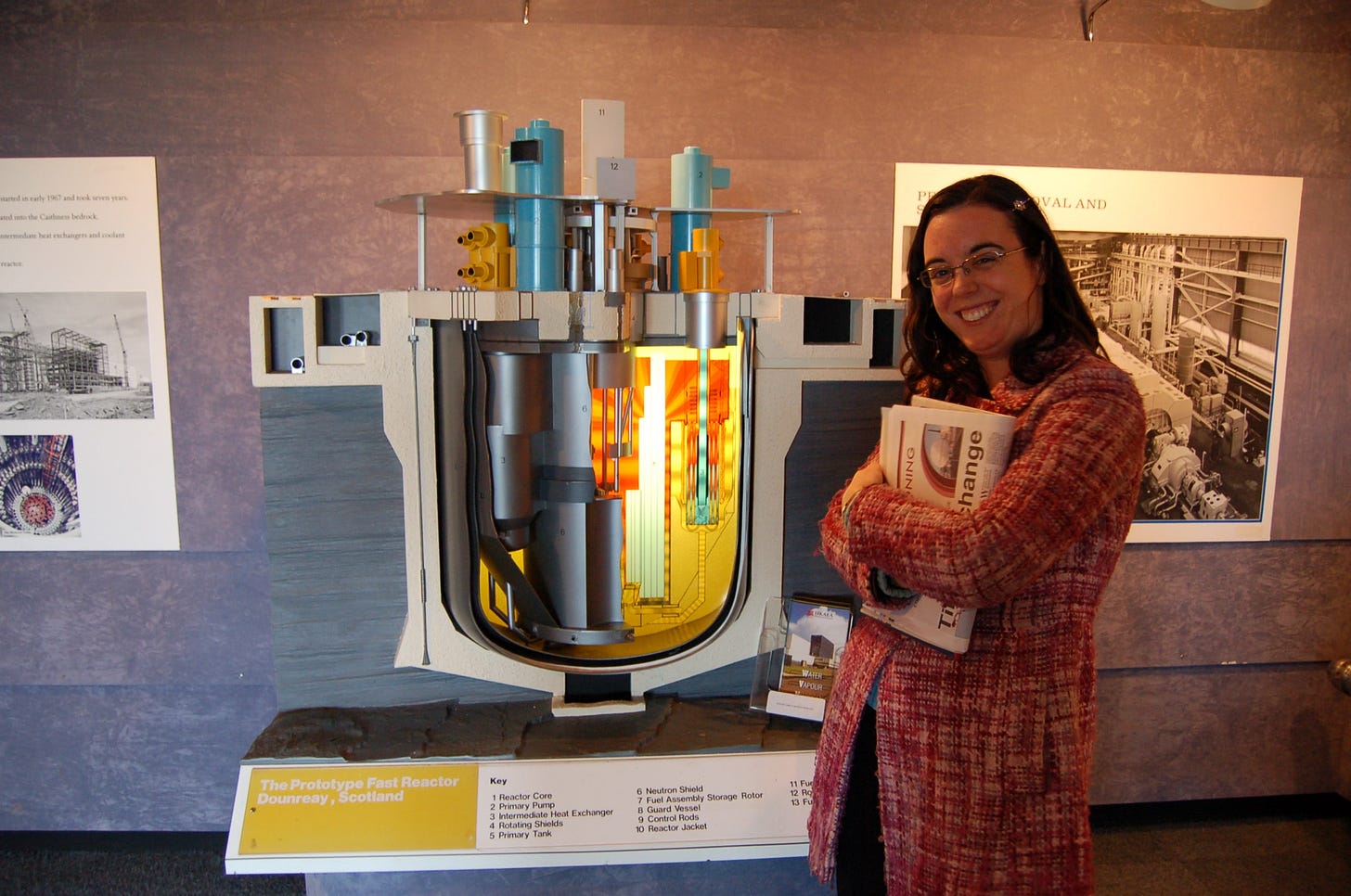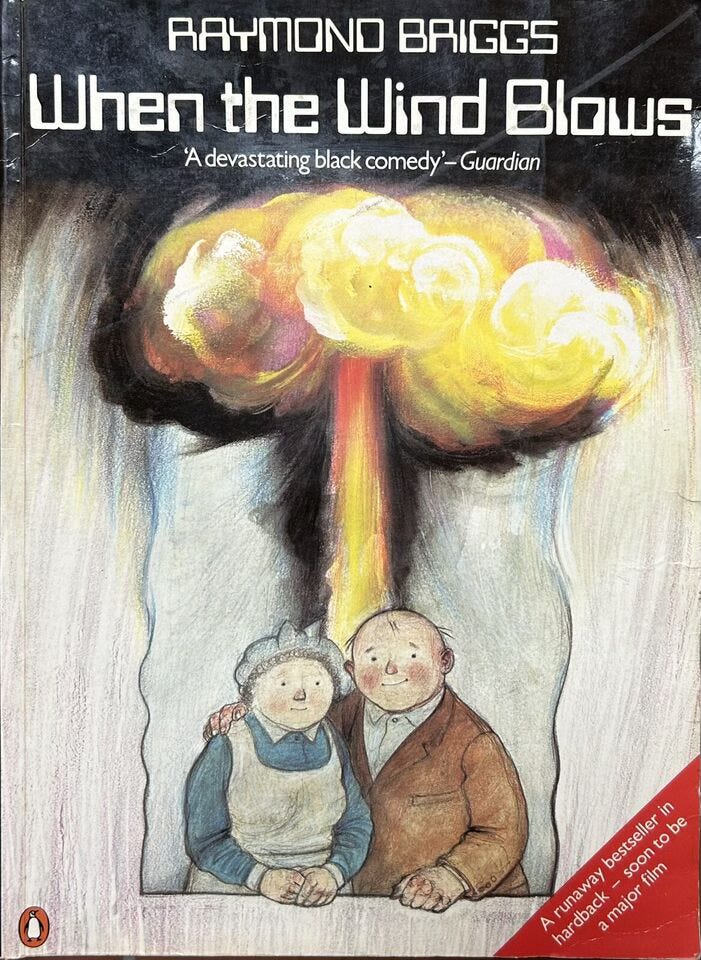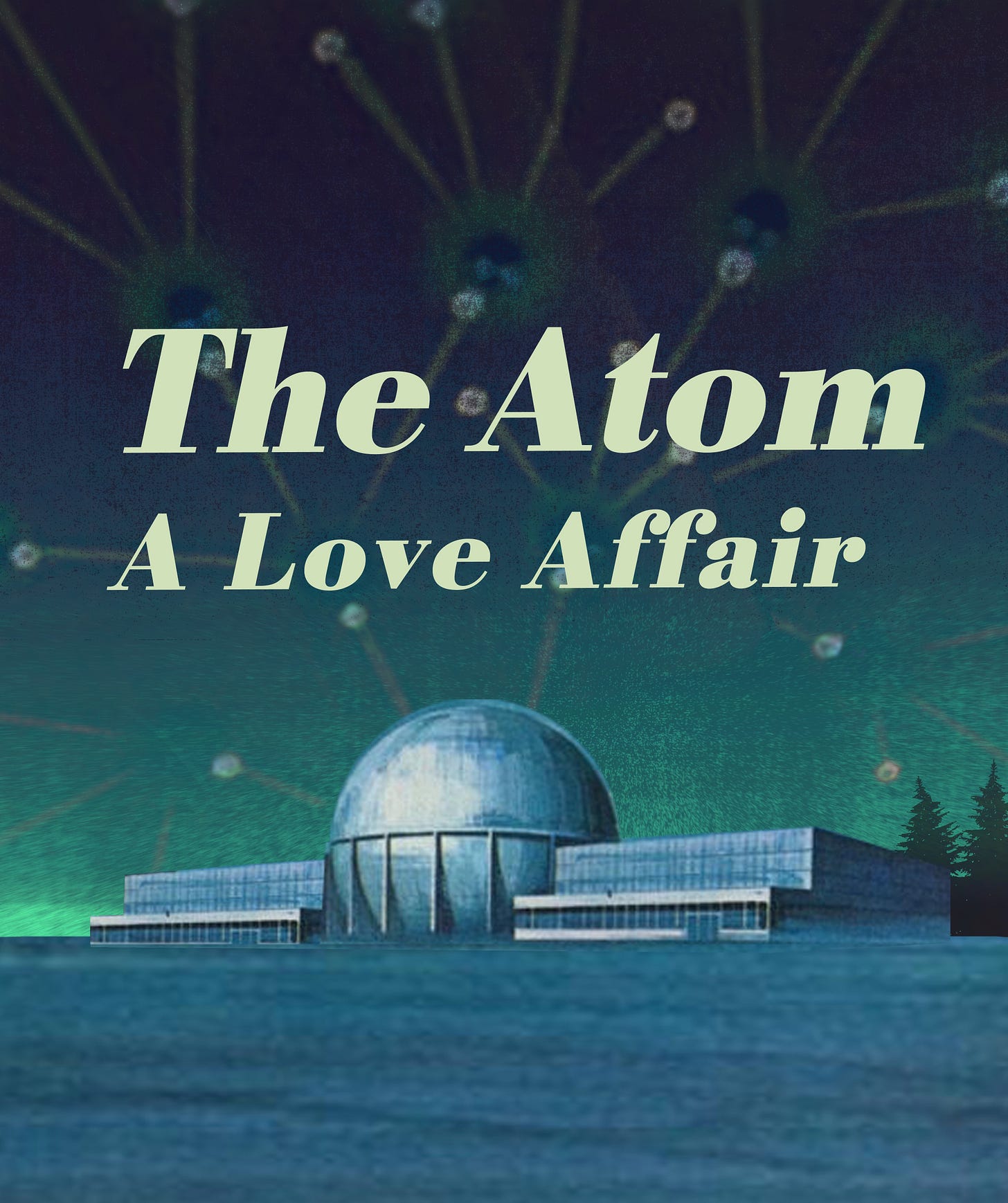The Atom & Us: Min-Kyoo Kim
“These people not only died in a moment of unfathomable violence; they were almost erased from memory altogether.”
Welcome to ‘The Atom & Us’, a new series of interviews in which I will be spotlighting the work and thought contributions of some of the incredibly interesting individuals I've been privileged to get to know through making & distributing my own nuclear history film, 'The Atom: A Love Affair'.
Over the coming weeks and months, I'll be sharing their stories and their insights into our atomic age - as scholars, artists, industry professionals, campaigners and more. Together, I hope their words will help deepen our understanding of one of the most vital & urgent - yet in my view also one of the least well-discussed & understood - topics of our 21st century world.
I’m so excited to finally launch this series which I’ve had brewing for a while now. But before I dive right into it, since this is the very first instalment, I thought I’d just give a little more background as to why I wanted to create the series - and why I think you’ll want to read it.
Speaking personally, I can attest that the field of nuclear issues is a fascinating terrain to explore – and certainly much more expansive and multi-faceted than I initially realised when I first started engaging with the topic in the mid-2000s.
Back then, I did have a vague sense of fear and unease elicited by the mention of nuclear catastrophes at Hiroshima & Chernobyl (though without clearly differentiating between them in terms of what actually happened). But still, my thoughts were mainly focused on the question of whether we did or didn't need nuclear power to generate electricity.

I knew next to nothing about so many of the bigger issues I had yet to really encounter or understand, including:
the nuclear fuel cycle, from mining to reprocessing, decommissioning and final waste storage
the intertwined yet diverging histories of military and civilian use
questions of democracy and ethics, colonialism, race and gender
deep time and the nuclear sublime, nuclear landscapes, architecture and heritage
competing technological iterations of nuclear power, as well as competing social and political visions for its place in society
international relations and geopolitics, Cold War deterrence and game theory
And much more besides…
Over close to two decades now, I've found this to be a mind-expanding and thought-provoking topic that opens the world up to examination - a truly compelling lens through which to think about so many different aspects of the complex societies we live in. It's my hope that by sharing these snapshots of some of the different ways people are interacting with and interrogating ‘the atom’1, I'll be able to open a window of greater understanding for you too.
In each interview in the series, I'll be putting the same set of questions to each contributor – with this broad framing serving as a jumping off point for them each to talk about their work and experiences of 'the atom' in whatever way they relate to it.
I’ll respond briefly at the end of each interview and then I’d love to open up a broader discussion. If you usually read via email, remember it's really easy just to hop on over to the Substack webpage or app and leave a comment (you can click the button just below or at the end).
I know a lot of people reading this have their own expertise and experience of diverse nuclear topics and it would be fantastic to make this a space of mutual learning and enlightenment by sharing our thoughts with one another as we go.
And so without further ado, it's my absolute pleasure to introduce you to my first contributor in the series:
Min-Kyoo Kim
Min is an interdisciplinary researcher currently studying for a phD at the Film & Screen department at the University of Cambridge. After my recent deep dive into the British nuclear war docudrama Threads, Min's work felt like an obvious first port of call for this series, dealing as it does with the depiction of nuclear violence in cinema and beyond. I'll pop back at the end with a few thoughts but for now, I'll leave you in his capable hands to tell you more about what 'the atom' means to him.
Who are you and what's your connection to 'the atom’?
My name is Min, and I’m a PhD candidate in Film and Screen Studies at the University of Cambridge. My research explores visual representations of nuclear violence and victimhood.
I particularly focus on histories that are occluded or marginalised in our mainstream narratives of nuclear proliferation: for example, the Korean victims of the atomic bombings of Hiroshima and Nagasaki; or the Marshall Islanders who have been, and remain, exiled from their homes, which were used for American nuclear testing.
My plan – my hope – is to identify methods by which our archive of the nuclear might be remediated and repurposed to redress these silenced and ‘un-visualised’ stories.
Tell me about your early memories, thoughts & feelings about nuclear - can you remember when & how you first encountered anything atomic (something you read or saw on the news, or at school maybe, or encountered some other way?)
I was born in South Korea in 1998, before moving to the U.K. in 2003. Between CBBC and Teenage Mutant Ninja Turtles (with a radioactive subtext of its own, of course), my parents and I learned English watching the news. I can vividly remember my mum and dad with their notebooks in front of the television.
You might also remember that the news at the time was pre-occupied with the war in Iraq and – finally, in response to your question – the pursuit of WMDs. When I asked my dad what they were, he was rather unsparing in describing their consequences to a five-year old child… and the fact that such weapons in Iraq later turned out to be a fairy tale proved to be no consolation.
Under the spectacle of the mushroom cloud lies a multitude of stories yet to be told, injustices yet to be redressed.
A few years later, North Korea conducted its first nuclear test. My family in Seoul felt both closer and more remote at the same time; that anxious lump in my throat has stayed there since.
When did you first become actively engaged in working in/ thinking about nuclear and what did that look like for you?
I began studying International Relations at the LSE just as Donald Trump became President. As he boasted that his “Nuclear Button” was “much bigger & more powerful” in a stand-off with Kim Jong-un, I was struck by how models and theories in political science are often divorced from the reality of how people – both citizens and policymakers – see, talk and actually feel about nuclear weapons.
I went onto study for a Master’s degree in Film at Cambridge where I became further interested in the relationship between visual culture and nuclear proliferation. I developed a PhD project out of it, which I’m working on now. A lot of time, inevitably, is spent alone reading and writing in the library – but some of the true highlights have been meeting with other scholars, activists and artists in the field, who continue to inform and inspire my research.
Is there an event or experience from your personal involvement with nuclear that particularly stands out in your memory and why?
After finishing my Master’s, I went travelling in Korea. It was in a local museum in Busan, in the south-east of the country, that I first learned that tens of thousands of Koreans – alongside Chinese and other East Asians, as colonised subjects of Japan – had been killed in the atomic bombings in Hiroshima and Nagasaki. These people not only died in a moment of unfathomable violence; they were almost erased from memory altogether.
This, I think, is the horrifying character of nuclear weapons; under the spectacle of the mushroom cloud lies a multitude of stories yet to be told, injustices yet to be redressed. Crucially, it’s not just the bombs themselves – it’s the untold legacies of extracting radioactive material in places like Congo, or the consequences of tests conducted on Indigenous territories around the globe, that demand our attention.
Why do you personally find it a compelling topic?
I have two answers, one academic and one more personal and political.
Regarding my research, I’ve been interested in how eye-witness testimonies of nuclear explosions focus on the blinding effects of the atomic flash. The very impossibility of perceiving this violence obviously poses a challenge to the medium of film and photography. For me, this blinding effect of the bomb also enacts a metaphor for how mainstream culture and politics tend to forget the other myriad forms of violence associated with nuclear proliferation, as in the cases I outlined in the previous answer.
Then, there’s the personal/ political answer, which is altogether simpler: I believe in a world without nuclear weapons. Now, like any stressed PhD student, I find myself asking what my work actually means, if anything. It’s why I’ve so appreciated meeting other scholars, activists and artists working in this area; the opportunity to share knowledge, not only with each other but with the wider public, is something that keeps me going.
Why do you think it has always been such a polarising issue and do you have any thoughts on if/how the discourse can be expanded to move beyond a simplistic pro- or anti- binary opposition?
I do believe – simplistically – that there is no moral justification for nuclear weapons. According to the Bulletin of Atomic Scientists, the Doomsday Clock is closer to Midnight (the symbolic hour of apocalypse) than at any previous point, so as far as I’m concerned, there is no time for ambiguity.
The real complexity of the discourse is when we talk about nuclear power in the civil sphere. It would seem that nuclear power is indispensable to any hopes of a future with clean, renewable energy.
I would just bear in mind, at the same time, that the boundaries between civil and military uses of nuclear power are blurred, and that these infrastructures can be appropriated for either purpose: the case of the Windscale fire in 1957, in the U.K., was an early example, while EDF recently announced that they would produce radioactive material for France’s nuclear weapons programme.
What's the most interesting or important thing about nuclear you'd want to tell people that they might not already know?
I feel that I’ve lectured any readers too much already! I would maybe just add this principle, which has guided my research: ask the most basic, even obvious questions. Using the recent case of Christopher Nolan’s Oppenheimer (2023) as a springboard:
Where did the uranium for the Manhattan Project come from? Here’s your answer.
What happened to the Indigenous people of New Mexico, where the Trinity test was conducted?
It’s this kind of questioning that yields the most interesting – and horrifying – aspects of nuclear proliferation, the stories that lie beyond the frame of mainstream representation.
I’ll also include this separately as it’s something I’m working on in my thesis: most of us, I’m sure, know what a bikini is, but probably not why it’s called that…
Do you have a favourite bit of atomic culture (song, film, book, video game – anything else!) you'd like to share?
I should share a catalogue of films, but I’d actually like to take the opportunity to list one(-ish) of each medium:
• Song: Kate Bush’s Breathing (1980)
• Film: Lynne Littman’s Testament (1983) - one of the (very) rare examples of a film about nuclear apocalypse by a female director, and one of the most moving overall. Threads (1984) also gets an honourable mention!
• Book: Raymond Briggs’s graphic novel When the Wind Blows (1982) – a bit of a cheat, but I’d also suggest the animated film…featuring a soundtrack by David Bowie!
I want to thank Min so much for answering my questions so thoughtfully (and for going first!) There's so much to think about in what he says.
He's absolutely correct, I think, to highlight a mismatch between the framing of the theoretical use of nuclear weapons in political discourse - and the lived and felt reality. It's salutary to be reminded of how weapons of mass destruction were talked about around the time of the Iraq war - even the very abbreviation 'WMD' seems to flatten and minimise what these weapons actually are, amidst all the technical and legalistic arguing over whether Saddam Hussein possessed them or not.
But above all, I'm struck by his desire to bring into the light the many, many hidden stories around nuclear weapons that have for too long been obscured from mainstream view. As he so eloquently puts it:
this blinding effect of the bomb also enacts a metaphor for how mainstream culture and politics tend to forget the other myriad forms of violence associated with nuclear proliferation
I was already aware of the scandalous treatment of many indigenous communities around the world, in relation both to uranium mining and to the impact of nuclear weapons testing. But I'm ashamed to say I was entirely unaware of the scale of Korean casualties from the atomic bombs in Japan.2
Strangely though (or perhaps it's not really strange at all), soon after I read Min's words, I encountered another much more recent example of how Koreans have been impacted by nuclear events in Japan, when watching a new feature documentary now streaming on Apple TV+, The Last of the Sea Women.
The film is about Korea's traditional haenyeo fisherwomen, now largely in their 60s, 70s and 80s, who dive without oxygen tanks to fish for sea urchin and conch. The practice is becoming increasingly rare thanks to pressures from several different fronts - including the discharge of radioactive water from the damaged reactors at Fukushima. There's an excellent review of the film from
who writes on Substack at here.Without this documentary (and honestly, although it is touched on briefly in the trailer, most of the written promos I’ve seen don’t explicitly mention the nuclear aspect, despite it taking up most of the second half of the film), how many people would know anything about this community of elderly fisherwomen and their intimate connection to the disaster at Fukushima? And yet, the impact on their culture and livelihoods exists, whether or not the world is looking. An example of precisely the sort of erasure Min is talking about.
And finally, just before I go, I CAN’T believe that I didn't know the Kate Bush record Min recommends 😱 Honestly, what kind of a child of the 80s even am I?!! I’m so glad to have been made aware of it though. The lyrics and the video are both absolutely haunting…
I really hope you’ve enjoyed reading this first edition of ‘The Atom & Us’ as much as I enjoyed putting it together for you and I look forward to bringing you the next interview in the series in a couple of weeks time.
Till then, please do let me know what you think. And if you have any ideas for other fascinating folk I should interview, I’m very open to suggestions…
Watch my film on Netflix (in Europe) or Vimeo (everywhere else) - or see trailer, reviews & bonus content HERE
Find me on X /Twitter & at LinkedIn
Life stories website – coming soon...
I’m lifting the personification here from my film, in which the central conceit is of nuclear power, or ‘the atom’, as the romantic hero of a turbulent, on-again, off-again love affair
There's a long and complex history of Korean immigration to Japan which I've only recently begun learning about from watching the excellent Apple TV adaptation of the bestselling 2017 novel Pachinko – highly recommended if you've not read or seen either version









Yes, A great start to a promising series.
My own thoughts on ending nuclear weapons -
It is going to take the most massive cultural change:
So much is bound up with the nuclear industry - and not just political beliefs,fears, and national pride, and the power of the men at the top.
So many millions of jobs connected, and thousands of local economies.
And all involved with the need to live more simply, change from the growth economy - so many, many people would have to give up something, and so many many people unwilling to help them
Great start to the series! I also knew nothing of the impact on Korea although should’ve realised there’d be some given their neighbours with an entwined history. I do know Kate Bush’s Breathing. I have the album. The impact of mining seems to be something people forget - big issue here in Australia where the Liberal party is back on its nuclear power obsession…